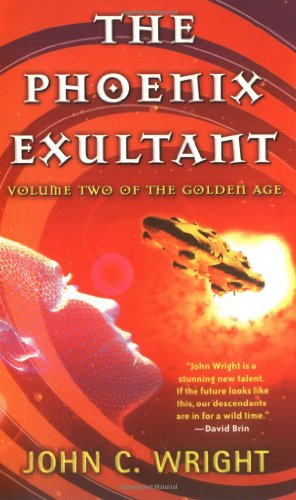
![]() The Phoenix Exultant by John C. Wright
The Phoenix Exultant by John C. Wright
I was really disappointed with The Phoenix Exultant, the second novel in John C. Wright’s THE GOLDEN AGE series, especially considering how much I had enjoyed its predecessor, The Golden Age. In many ways The Phoenix Exultant just did not feel like a true continuation of the first book.
One of the major stumbling blocks for me was that I just couldn’t believe the way Wright handled the voices he used for the characters in this volume. Considering his mannered and baroque set up in the previous volume I found the dialogue to be way too colloquial (and 20th century colloquial at that). Maybe Wright was trying to show Phaeton “stepping down” a level, both socially due to his exile and intellectually due to his loss of certain artificial brain upgrades, but it really grated on me. Atkins and Daphne were also throwing around way too much colloquial verbiage in my humble opinion.
I also think Wright relied far too much on exposition for character actions and motives… he told us way more than he showed us, as if he felt he had to explain all of the details to us because we’d never figure it out for ourselves.
I understand that these characters are posthumans who are able to modify themselves in various ways, but it seemed like the character of Daphne became a completely different person. She goes from victim to hero in one mighty leap that has no explanation… I guess she must have downloaded the Nancy Drew persona since the last volume.
Ultimately, in looking back after I finished it, it seemed that not very much really happened in the course of The Phoenix Exultant. Phaeton just acts more or less clueless and like a pompous ass and eventually finds the loopholes (and hidden allies) he needs thanks to the plot master (don’t look behind the curtain!).
Certainly it wasn’t all bad, but the sensawunda and deeper level of thought and execution of The Golden Age were missing for the most part in The Phoenix Exultant.
The Golden Age — (2001-2003) Publisher: The Golden Age is Grand Space Opera, a large-scale SF adventure novel in the tradition of A. E. Van vogt and Roger Zelazny, with perhaps a bit of Cordwainer Smith enriching the style. It is an astounding story of super science, a thrilling wonder story that recaptures the excitements of SF’s golden age writers. The Golden Age takes place 10,000 years in the future in our solar system, an interplanetary utopian society filled with immortal humans. Within the frame of a traditional tale — the one rebel who is unhappy in utopia — Wright spins an elaborate plot web filled with suspense and passion. Phaethon, of Radamanthus House, is attending a glorious party at his family mansion to celebrate the thousand-year anniversary of the High Transcendence. There he meets first an old man who accuses him of being an impostor and then a being from Neptune who claims to be an old friend. The Neptunian tells him that essential parts of his memory were removed and stored by the very government that Phaethon believes to be wholly honorable. It shakes his faith. He is an exile from himself. And so Phaethon embarks upon a quest across the transformed solar system — Jupiter is now a second sun, Mars and Venus terraformed, humanity immortal — among humans, intelligent machines, and bizarre life forms that are partly both, to recover his memory, and to learn what crime he planned that warranted such preemptive punishment. His quest is to regain his true identity. The Golden Age is one of the major, ambitious SF novels of the year and the international launch of an important new writer in the genre.






Do it! One of the best things I've read in recent years.
This reminds me. I want to read Addie LaRue.
We’re in total agreement David!
I felt just the same. The prose and character work was excellent. The larger story was unsatisfying, especially compared to…
Hmmm. I think I'll pass.